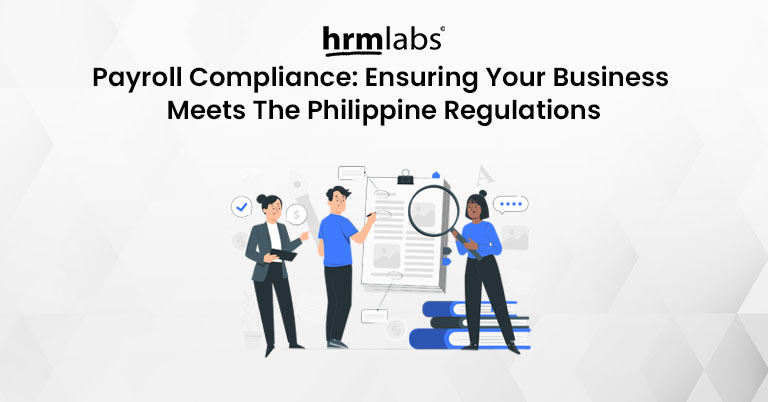Payroll compliance might sound like a dry topic, but it’s actually a crucial aspect of running a successful business in the Philippines. It’s about more than just crunching numbers; it’s about ensuring fair treatment for your employees and avoiding costly penalties.
In the ever-evolving landscape of business in a country like the Philippines with its intricate regulatory framework., compliance is a must. For young professionals and business owners alike, understanding these regulations is crucial not only for legal compliance but also for fostering a fair and efficient workplace.
This article explores the importance of payroll compliance and offers insights on how to ensure your business meets the Philippine regulations effectively.
Understanding Payroll Compliance
Payroll compliance refers to the process by which businesses adhere to the laws and regulations governing payroll processes and payroll taxes. In the Philippines, this involves a comprehensive understanding of various statutory requirements, including income tax, social security, health insurance, and contributions to the Home Development Mutual Fund (Pag-IBIG).
Key Payroll Compliance Regulations in the Philippines
Navigating payroll compliance in the Philippines requires a thorough understanding of various regulatory obligations that businesses must meet. Here are the key payroll compliance regulations that every employer in the Philippines should be aware of.
Income Tax Withholding
Employers in the Philippines are required to act as withholding agents for their employees’ income taxes. This involves deducting the appropriate amount from employees’ salaries based on the graduated income tax system, which ranges from 0% for those earning up to ₱250,000 annually to 35% for those earning over ₱8,000,000 annually.
Social Security System (SSS)
The SSS is a mandatory insurance program that covers employees for various contingencies such as disability, sickness, maternity, and old age. Employers must contribute 9.5% of the employees’ monthly salary, while employees contribute 4.5%, with respective caps.
Philippine Health Insurance Corporation (PhilHealth)
PhilHealth provides health insurance coverage to employees. Employers and employees each contribute 2% of the employee’s base monthly wage, with an income ceiling of ₱80,000.
Home Development Mutual Fund (Pag-IBIG)
Pag-IBIG is a savings fund aimed at providing affordable housing loans to employees. Employers contribute 2% of the employee’s monthly salary, while employees contribute 1% for salaries up to ₱1,500 and 2% for salaries above ₱1,500.
13th Month Pay
All employees who have worked for at least one month during the calendar year are entitled to a 13th-month pay, equivalent to one-twelfth of their total basic salary within the year. This must be provided before December 24 each year.
Challenges of Payroll Compliance
Ensuring payroll compliance in the Philippines presents several challenges that can strain resources, especially for small businesses and startups. The complexity of regulations, coupled with time-consuming processes and the risk of errors, makes it a demanding aspect of business operations.
Complexity of Regulations
Navigating the myriad of laws and regulations can be daunting, particularly for small businesses or startups. Staying updated with changes in tax laws, wage orders, and social security contributions requires constant vigilance and expertise.
Time-Consuming Processes
Manually calculating payroll, deducting the correct amounts for taxes and contributions, and ensuring timely payments can be incredibly time-consuming. This process can divert valuable resources from core business activities.
Risk of Errors
Human error in payroll processing can lead to significant compliance issues, including underpayment or overpayment of taxes and contributions, which can result in fines and legal complications.
Ensuring Payroll Compliance with Technology
Leveraging technology, particularly cloud-based payroll software, can mitigate many of these challenges. Here’s how:
Automation
Payroll software can automate the calculation of salaries, tax deductions, and statutory contributions, reducing the risk of errors and ensuring accuracy. This automation can save considerable time and effort, allowing businesses to focus on growth and productivity.
Real-Time Updates
Modern payroll systems are regularly updated to reflect changes in laws and regulations. This ensures that businesses remain compliant without needing to manually track legislative changes.
Comprehensive Reporting
Payroll software can generate detailed reports that provide insights into payroll expenses, tax liabilities, and compliance status. These reports are essential for audit purposes and for making informed financial decisions.
Integration with Other Systems
Integrating payroll software with attendance and scheduling systems can further streamline operations. For example, HRMLabs offers a comprehensive solution that integrates payroll with attendance tracking, ensuring accurate calculation of hours worked, overtime, and leave balances.
Benefits of Compliance
Ensuring payroll compliance offers several benefits that can significantly impact your business’s success.
Avoidance of Penalties
Non-compliance can result in hefty fines, legal fees, and audits. By adhering to regulations, businesses can avoid these costly penalties (Paycom.com).
Enhanced Employee Trust
Timely and accurate payroll builds trust and confidence among employees, leading to higher morale and productivity. Employees are more likely to be satisfied and engaged when they feel their compensation is handled transparently and fairly.
Streamlined Operations
Efficient payroll processes reduce administrative burden and operational inefficiencies, allowing businesses to allocate resources more effectively and focus on strategic initiatives.
Conclusion
Payroll compliance is a critical aspect of business operations in the Philippines. By understanding and adhering to local regulations, businesses can avoid legal pitfalls, enhance employee satisfaction, and streamline their operations. Leveraging modern payroll software like HRMLabs can simplify compliance, reduce the risk of errors, and save valuable time and resources.
As the business landscape continues to evolve, staying compliant with payroll regulations will be essential for long-term success and growth.

